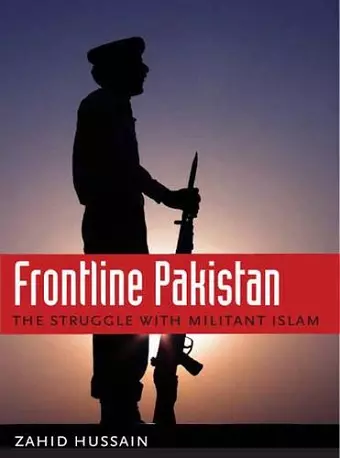Frontline Pakistan
The Struggle with Militant Islam
Format:Hardback
Publisher:Columbia University Press
Published:28th Nov '22
Should be back in stock very soon

Veteran Pakistani journalist and commentator Zahid Hussain explores Pakistan's complex political power web and the consequences of Musharraf's decision to support America's drive against jihadism, which essentially took Pakistan to war with itself. Conducting exclusive interviews with key players and grassroots radicals, Hussain pinpoints the origin of the jihadi movement in Pakistan and Afghanistan, the long-standing and often denied links between militants and Pakistani authorities, the weaknesses of successive elected governments, and the challenges to Musharraf's authority posed by politico-religious, sectarian, and civil society elements within the country. The jihadi madrassas of Pakistan are incubators of the most feared terrorists in the world. Although the country's "war on terror" has so far been a stage show, a very real battle is looming, the outcome of which will have grave implications for the future security of the world.
After September 11, 2001, Pakistan's president, Pervez Musharraf, vowed to fight extremism in his country and has since established himself as a key ally in America's "global war on terror." This book exposes the threads of Pakistan's complex political power web and consequences of Musharraf's decision to support the US' drive against jihadism.After September 11, 2001, Pakistan's president, Pervez Musharraf, vowed to fight extremism in his country and has since established himself as a key ally in America's "global war on terror." But as veteran Pakistani journalist and commentator Zahid Hussain reveals in this book, Musharraf is in an impossible position. The Pakistani army and intelligence services are thoroughly penetrated by jihadists. In fact, the current government came into power through its support of radical Islamist groups, such as those fighting in Kashmir. Based on exclusive interviews with key players and grassroots radicals, Hussain exposes the threads of Pakistan's complex political power web and the consequences of Musharraf's decision to support the U.S.'s drive against jihadism, which essentially took Pakistan to war with itself. He recounts the origins and nature of the jihadi movement in Pakistan and Afghanistan, the long-standing and often denied links between militants and Pakistani authorities, the weaknesses of successive elected governments, and the challenges to Musharraf's authority posed by politico-religious, sectarian, and civil society elements within the country. The jihadi madrassas of Pakistan are incubators of the most feared terrorists in the world. Osama bin Laden himself is believed to be hiding close to the Pakistani border. Although the country's "war on terror" has so far been a stage show, a very real battle is looming, the outcome of which will have grave implications for the future security of the world.
This book continues the excellent Pakistani journalistic tradition of writing contemporary history. -- Manvendra Singh India Today [Hussain] offers a detailed and persuasive account of the received wisdom on Pakistan since 9/11. -- Carl Brown Foreign Affairs A wonderful read that deserves to be read. Written in a dramatic narrative style, the book combines the virtues of being a compulsive page-turner with being informative. -- Vivek Balaraman Desicritics.org Hussain lucidly articulates the challenges and limitations faced by Musharraf... Highly Recommended. Choice [A] nuanced view of the political forces at work... It's a cautionary tale with lessons for other Asian countries. -- Mary Kissel and Hugo Restall Wall Street Journal Asia
ISBN: 9780231142243
Dimensions: unknown
Weight: unknown
232 pages